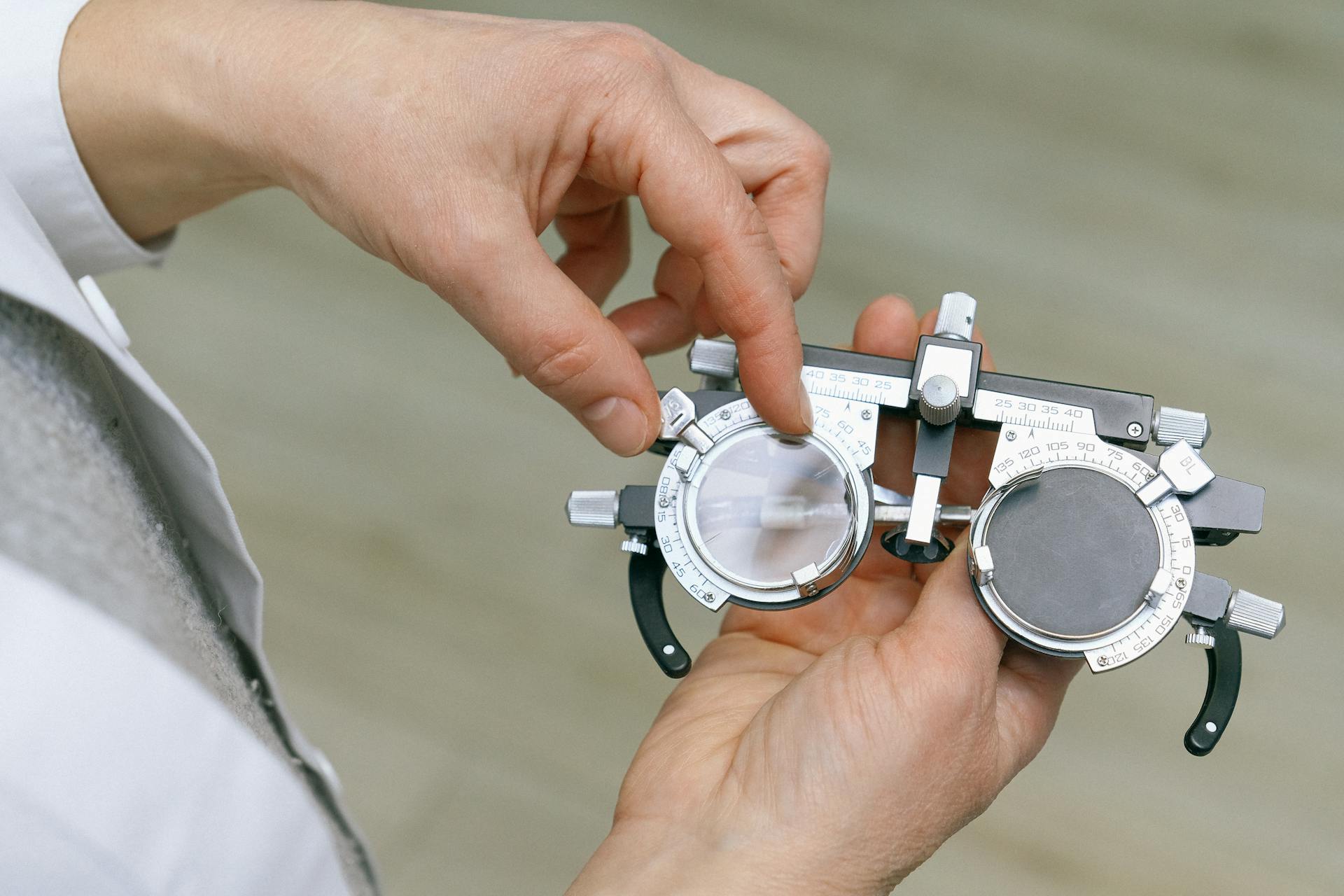
To become an independent claims adjuster, you'll need to meet specific training and licensing requirements. In most states, you'll need to complete a pre-licensing course that covers topics such as insurance law, ethics, and claims handling.
The length of these courses can vary, but typically ranges from 20 to 40 hours. Some states also require continuing education courses to maintain your license. In New York, for example, you'll need to complete 24 hours of continuing education every 2 years.
In addition to completing the required courses, you'll also need to pass a licensing exam. The exam will test your knowledge of insurance principles, laws, and regulations.
You might like: Florida Claims Adjuster License
Training and Licensing
To become a successful independent claims adjuster, you'll need to complete a training program that meets the requirements of your state. Some states require a license to handle and close insurance claims, so it's essential to check with your state's department of insurance to see if you need one.
You might enjoy: Do Claims Adjusters Need to Be Licensed
To obtain a license, you'll typically need to complete a preparatory course, pass a licensing exam, and pass a background check. Application instructions and requirements vary by state, so be sure to check with your state's department of insurance for specific details.
Training programs for independent claims adjusters usually include a minimum of 24 hours of continuing education hours every two years, with 3 hours dedicated to ethics. You can use the California Department of Insurance's Education Provider and Course Search to find the required courses for your state.
You might enjoy: Claims Adjuster Licensing Requirements by State
Education Requirements
As an independent insurance adjuster, you'll need to stay on top of your education requirements to maintain your license. You're required to complete a minimum of 24 hours of continuing education hours every two years, with 3 hours dedicated to ethics.
To find the required courses, you can use the California Department of Insurance's (CDI) Education Provider and Course Search. This will help you locate the necessary courses to complete your continuing education requirement, as outlined in Cal. Ins. Code Section 14090.1.
CDI also distributes an Annual Notice and Guide for Adjusting Property Claims in California After a Major Disaster to licensed adjusters, qualified managers, and insurers every January. This notice covers significant California laws effective as of the date of the notice, including those related to a declared state of emergency and CDI's Guide for Adjusting Property Claims in California After a Major Disaster.
Additionally, you'll need to complete California Code of Regulations (10 Cal. Code Regs.) Sections 2695.1 - 2696.14 training for all claims adjusters. This training and certification must be completed by all claims adjusters on or before September 1 of each calendar year, as stated in 10 Cal. Code Regs. Section 2695.6.
Here's a breakdown of the continuing education requirements:
- 24 hours of continuing education hours every 2 years
- 3 hours dedicated to ethics
- Training and certification in Cal. Code Regs. Sections 2695.1 - 2696.14 by September 1 of each calendar year
After a public official declares a state of emergency, you'll need to require your employees to read and understand CDI's most recent Annual Notice and Guide no later than 15 calendar days from the date they began claims adjusting activity in California, as per Cal. Ins. Code Section 14022(a)(2).
Obtain Your License
Obtaining your license is a crucial step in becoming an insurance adjuster. You'll need to obtain a license if your state requires one, which is a requirement for handling and closing insurance claims.
The licensing process involves completing a pre-licensing prep course provided by your home state or designated home state. This course will help you understand the information required to pass the licensing exam.
You'll need to pass the state's required licensing exam as part of the licensing process. This exam is a critical step in demonstrating your knowledge of the profession.
A background check may also be required as part of the licensing process. This is an important step in ensuring that you're a trustworthy and qualified professional.
To apply for your license, you'll need to submit your application along with the licensing fee. Note that application instructions and requirements vary by state.
Here's a step-by-step guide to the licensing process:
- Complete the pre-licensing prep course provided by your home state (or designated home state).
- Pass the state's required licensing exam.
- Pass a background check, if required.
- Submit your license application along with your payment for the licensing fee.
Keep in mind that you may need to wait a few weeks to receive your license, especially if you're applying in a state with a high volume of applicants.
Emergency Management Institute Online Courses
The Emergency Management Institute (EMI) offers a wide range of online courses to help you develop the skills you need to respond to emergencies.
EMI's online courses are designed to be flexible and accessible, allowing you to learn at your own pace and on your own schedule.
Discover more: Claims Adjuster Classes Online
Best Training in Jacksonville
Looking for top-notch training in Jacksonville? Pacesetter Academy has got you covered. They offer the best catastrophe adjuster training available, which has led to their graduates becoming highly sought-after adjusters.
Their training programs are designed to raise the bar in the industry. You can find their training opportunities on their website or through links to HAAG's training material, such as HAAG Books and Tools, HAAG's Online Training Library, and Classroom Training and HCI Program information.
At Pacesetter Academy, you can take Desk Adjuster classes, Evo Inspector training, and HOVER Application training. If you're interested in field representative training, check out VAS (Veteran Adjusting School) and AIA (Academy of Insurance Adjusting). They offer first-rate education in insurance claim adjusting and can make their graduates essential to the insurance industry.
Here are some specific training resources to consider:
- HAAG Books and Tools: www.haageducation.com
- HAAG’s Online Training Library: www.haageducation.com/learn
- Classroom Training and HCI Program information: www.haagcertifiedinspector.com
- Desk Adjuster classes: Pacesetter Academy
- Evo Inspector training: Pacesetter Academy
- HOVER Application training: Pacesetter Academy
- VAS (Veteran Adjusting School) and AIA (Academy of Insurance Adjusting): for field representative training
Authorizing Act
In California, insurance adjusters are regulated by the Cal. Ins. Code Section 14021.
An insurance adjuster is defined as a person who engages in the business of making an investigation for the purpose of obtaining information in the course of adjusting or participating in the disposal of any claim in connection with a policy of insurance.
This definition specifically excludes private investigators, who may also be involved in investigations, but not in the context of insurance claims.
To be considered an insurance adjuster, one must engage in this business for any consideration whatsoever, meaning they can be paid for their services, or they can receive other forms of compensation.
Resources and Opportunities
As an independent claims adjuster, it's essential to stay up-to-date with the latest training opportunities to enhance your skills and knowledge. One way to do this is by attending virtual training sessions, such as the Fire / PropertyCarrier-Specific Fire Certification, which will be held on Jan 15 - 16, 2025, and Feb 26 - 27, 2025.
A fresh viewpoint: Fire Insurance Exchange
You can also opt for in-person training sessions, like the 5-Day Adjuster Basics course, which will be held in Norcross, GA, on Jan 27 - 31, 2025, and in Allen, TX, on Feb 24 - 28, 2025.
Here are some upcoming training opportunities to consider:
These are just a few examples of the many training opportunities available to independent claims adjusters. By taking advantage of these resources, you can stay ahead of the curve and provide the best possible service to your clients.
Learn to Use Helpful Tools
As a home insurance adjuster, you'll want to equip yourself with the right tools to scope losses effectively. A mobile device with a high-quality camera is essential for capturing evidence of damage.
You'll also need a Bluetooth laser distance meter for precise measurements. This tool will help you accurately assess the extent of the damage.
A mobile floor plan app can be a game-changer, allowing you to create detailed floor plans of the property. This will help you identify the affected areas and document the damage more efficiently.
Here are some key tools to consider:
- A mobile device equipped with a high-quality camera
- A Bluetooth laser distance meter for precise measurements
- A mobile floor plan app that allows you to create detailed floor plans
Upcoming Training Opportunities
If you're looking to enhance your skills or advance your career, there are plenty of training opportunities available.
Fire and property insurance professionals can benefit from the Fire / PropertyCarrier-Specific Fire Certification, which is offered virtually on January 15-16, 2025, and again on February 26-27, 2025, and March 19-20, 2025.
Auto insurance professionals can also take advantage of the AutoCarrier-Specific Auto Certification, which is available virtually on January 17, 2025, February 28, 2025, and April 18, 2025.
For those new to the field, the 5-Day Adjuster Basics course is a great starting point. It's being offered in Allen, TX, on February 24-28, 2025, and again on March 10-14, 2025, and April 7-11, 2025.
Here are the upcoming training opportunities:
Past Opportunities
Past opportunities for training and certification were available in various formats, including virtual and in-person sessions.
Some of these opportunities were specifically designed for beginners, such as the 5-day Adjuster Basics course, which was held in Norcross, GA, and Allen, TX.
Check this out: Gds Claims - Public Adjuster

The course dates were August 26-30, 2024, and July 22-26, 2024.
Several certifications were also available, including Carrier-Specific Fire Certification, Carrier Auto Certification, and Digital Desk Certification Class.
These certifications were offered virtually, with dates ranging from August 14-15, 2024, to July 2, 2024.
Here's a list of some of the past training opportunities:
These are just a few examples of the past opportunities that were available for training and certification.
Flood Control Number
You'll need to register with the NFIP and possess an active Flood Control Number (FCN) to adjust flood losses.
The deadline for obtaining an FCN or changing any category is June 30, 2024.
To get an FCN, you can find the Adjuster Registration Application on the NFIP website.
You can also email [email protected] with specific questions about the NFIP Adjuster Registration process or your FCN card.
This course is approved for 6 hours of continuing education credit in select states, and you can click here for more information.
Consider reading: How to Become a Fema Claims Adjuster
Frequently Asked Questions
Is there a demand for independent insurance adjusters?
Yes, there is a growing demand for skilled independent insurance adjusters who can navigate the evolving landscape of claims management. With the insurance industry undergoing rapid transformation, experienced adjusters are in high demand to meet changing consumer expectations and technological advancements.
Is being an independent adjuster hard?
Being an independent adjuster can be challenging due to managing difficult clients, tight deadlines, and staying current with technical knowledge. However, many find the profession rewarding and worth the effort with the right skills and support.
Sources
- https://www.insurance.ca.gov/0200-industry/0050-renew-license/0200-requirements/insurance-adjuster.cfm
- https://www.crawco.com/cat/training
- https://blog.magicplan.app/how-to-become-independent-insurance-claims-adjuster-six-steps
- https://nfipservices.floodsmart.gov/training/adjuster
- https://pacesetterclaims.com/pasadena-california/
Featured Images: pexels.com


